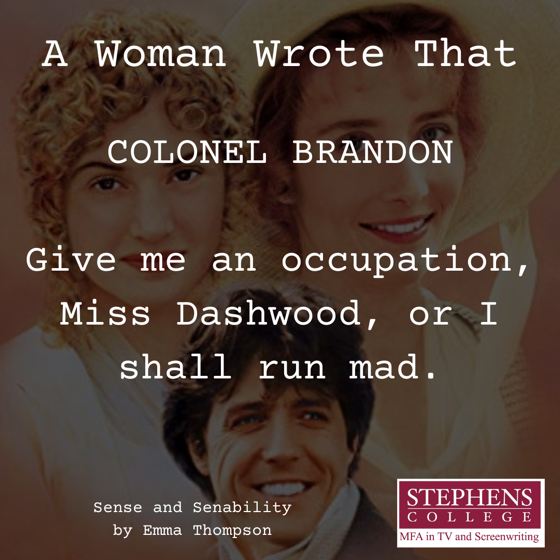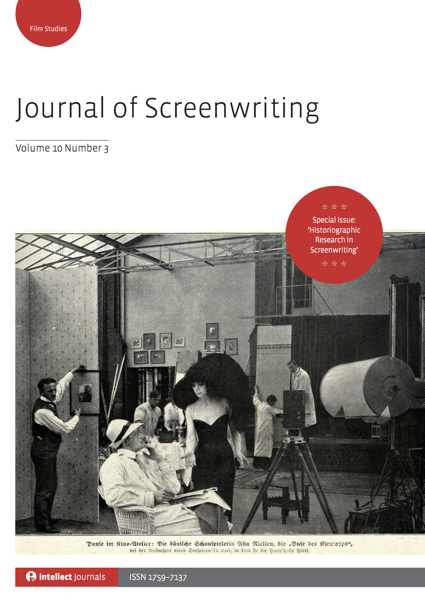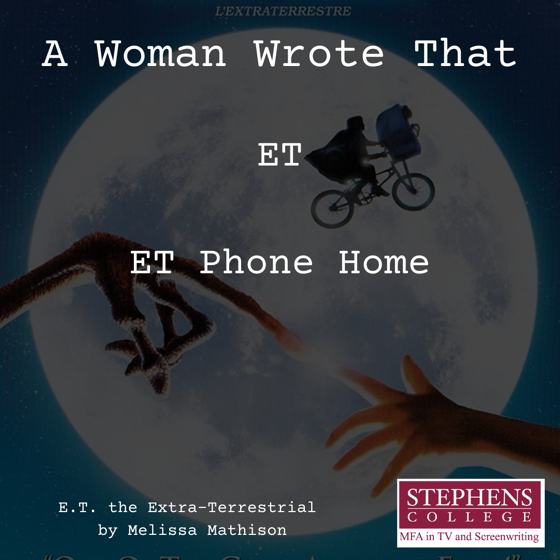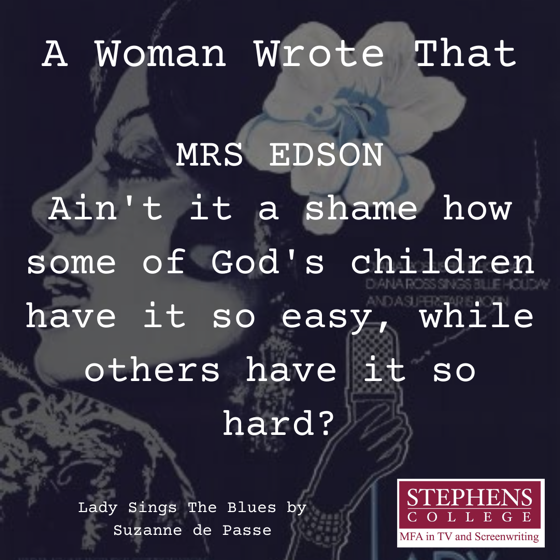Join our low-residency MFA in TV and Screenwriting to share in our mission of bringing more female and underrepresented voices into mainstream media.
Category: Television
A Woman Wrote That – 5 in a series – Sense and Sensibility by Emma Thompson (1995)
This new “A Woman Wrote That” post is an echo of the Writers Guild campaign of a few years ago (“A Writer Wrote That”) where they noted famous movie quotes and credited the screenwriter rather than the director. The difference here being that we will be posting lines from films written by female screenwriters. Feel free to share! — Rosanne

COLONEL BRANDON: “Give me an occupation, Miss Dashwood, or I shall run mad.”
- Sense and Sensibility on IMDB
- Emma Thompson on Wikipedia and IMDB
- Stephens College MFA in TV and Screenwriting
There And Back Again: Writing and Developing for American Television]: from Freelancing to Writers Rooms [Video] (52 minutes)
Thanks to the gracious invitation from my Screenwriting Research Network colleague Paolo Russo – and a grant he was able to procure (and in the before-Covid time) I was able to spend a week at Oxford Brookes University working with the screenwriting masters students in Paolo’s course. At the culmination of the week, I gave this lecture on how writers rooms worked in the States.
Subscribe to Rosanne’s Channel and receive notice of each new video!
* A portion of each sale from Amazon.com directly supports our blogs
** Many of these books may be available from your local library. Check it out!
† Available from the LA Public Library
From The Journal Of Screenwriting V3 Issue 1: Television and film screenwriters: How to reach a global audience by Philippe Perebinossoff
Highlighting the articles in the past editions of the Journal of Screenwriting, of which I am the Book Reviews Editor. Hopefully these abstracts will entice you to did a little deeper into the history and future of screenwriting. — Rosanne
Television and film screenwriters: How to reach a global audience by Philippe Perebinossoff
The focus of this article will be on an examination of American television and film projects and their inceptions and/or receptions in various marketplaces. In addition, the article will explore some of the specific cultural differences around the world that may be of importance to screenwriters.
The Journal of Screenwriting is an international double-blind peer-reviewed journal that is published three times a year. The journal highlights current academic and professional thinking about the screenplay and intends to promote, stimulate and bring together current research and contemporary debates around the screenplay whilst encouraging groundbreaking research in an international arena. The journal is discursive, critical, rigorous and engages with issues in a dynamic and developing field, linking academic theory to screenwriting practice.
Get your copy and subscription to the Journal of Screenwriting Today!
* A portion of each sale from Amazon.com directly supports our blogs
** Many of these books may be available from your local library. Check it out!
A Woman Wrote That – 4 in a series – Thelma and Louise by Callie Khouri (1991)
This new “A Woman Wrote That” post is an echo of the Writers Guild campaign of a few years ago (“A Writer Wrote That”) where they noted famous movie quotes and credited the screenwriter rather than the director. The difference here being that we will be posting lines from films written by female screenwriters. Feel free to share! — Rosanne
Louise: “You get what you settle for.”
Thelma and Louise Script (PDF)
- Thelma and Louise on Wikipedia and IMDB
- Callie Khouri on Wikipedia and IMDB
- Stephens College MFA in TV and Screenwriting
From The Journal Of Screenwriting V3 Issue 1: Irish cinema 1994–2009: The trajectory of script development policy at the Irish Film Board by Díóg O’Connell
Highlighting the articles in the past editions of the Journal of Screenwriting, of which I am the Book Reviews Editor. Hopefully these abstracts will entice you to did a little deeper into the history and future of screenwriting. — Rosanne
This article explores the changing nature of public policy in Ireland, 1994–2009, as it relates to film and scriptwriting practice. The dominant discourse in Irish cinema studies has centred around ideas of identity, national identity in particular with more recent studies branching off in the direction of genre studies, political economy and narrative studies. This article is framed, broadly speaking, within a political economy discourse, by way of exploring how Irish Film Board policy changed over a specific period as a result of internal and external factors, shaping a structure that would determine how Irish scriptwriters related to the wider field of film production. Through a survey of Irish Film Board policies, newspaper articles and annual reports, this article presents a general historical overview of an evolving film policy as it related directly to scriptwriting and script development. Against this backdrop, other questions surface about Irish cinema and scriptwriting practice, particularly questions centred on local/global issues.
The Journal of Screenwriting is an international double-blind peer-reviewed journal that is published three times a year. The journal highlights current academic and professional thinking about the screenplay and intends to promote, stimulate and bring together current research and contemporary debates around the screenplay whilst encouraging groundbreaking research in an international arena. The journal is discursive, critical, rigorous and engages with issues in a dynamic and developing field, linking academic theory to screenwriting practice.
Get your copy and subscription to the Journal of Screenwriting Today!
* A portion of each sale from Amazon.com directly supports our blogs
** Many of these books may be available from your local library. Check it out!
A Woman Wrote That – 3 in a series – E.T. the Extra-Terrestrial
This new “A Woman Wrote That” post is an echo of the Writers Guild campaign of a few years ago (“A Writer Wrote That”) where they noted famous movie quotes and credited the screenwriter rather than the director. The difference here being that we will be posting lines from films written by female screenwriters. Feel free to share! — Rosanne
“ET Phone Home”
E.T. the Extra-Terrestrial Shooting Script (PDF)
E.T. the Extra-Terrestrial on IMDB
- E.T. the Extra-Terrestrial on Wikipedia and IMDB
- Melissa Mathison on Wikipedia and IMDB
- Stephens College MFA in TV and Screenwriting
Event: Stephens MFA in TV and Screenwriting Online Open House – Wednesday, November 18, 2020 – 4pm PST
Click To Register For The Event
Join our program director, Dr. Rosanne Welch, for a virtual open house to learn more about our Master of Fine Arts in TV and Screenwriting. As we prepare to welcome the 2021 cohort in fall 2021, we invite you to learn about the program, hear how the admissions process works, and an open Q&A to get all your questions answered.
Write
Reach
Represent
Online Open House with
Program Executive Director Dr. Rosanne Welch
and Director of Admissions Alexandra Miller
Stephens College Low Residency MFA in TV and Screenwriting
Check for your local time zone:
New York, USA Wed, Nov 18, 2020 at 7:00 pm EST
Columbia, USA Wed, Nov 18, 2020 at 6:00 pm CST
Denver, USA Wed, Nov 18, 2020 at 5:00 pm MST
Los Angeles, USA Wed, Nov 18, 2020 at 4:00 pm PST
From The Journal Of Screenwriting V3 Issue 1: The constructive use of film genre for the screenwriter: The relevant knowledge component of the mental space of film genre by Jule Selbo
Highlighting the articles in the past editions of the Journal of Screenwriting, of which I am the Book Reviews Editor. Hopefully these abstracts will entice you to did a little deeper into the history and future of screenwriting. — Rosanne
This exploration is a continuation of my work on the ‘mental space of film genre’, a term I have coined to introduce a terminology to investigate the use of film genre for the screenwriter as he or she constructs a screenplay. Understanding this use of film genre may add to the screenwriter’s other technical skills such as knowledge of story structure and character construction. I have previously delineated the first two elements of the mental space of film genre in the second issue of the Journal of Screenwriting – schematic knowledge (the use of film genre as a framing device) and specific knowledge (the understanding of film genre the audience brings to the viewing of filmic narratives). This work will then focus on what I believe to be the important third element of the mental space of film genre – relevant knowledge.
The Journal of Screenwriting is an international double-blind peer-reviewed journal that is published three times a year. The journal highlights current academic and professional thinking about the screenplay and intends to promote, stimulate and bring together current research and contemporary debates around the screenplay whilst encouraging groundbreaking research in an international arena. The journal is discursive, critical, rigorous and engages with issues in a dynamic and developing field, linking academic theory to screenwriting practice.
Get your copy and subscription to the Journal of Screenwriting Today!
* A portion of each sale from Amazon.com directly supports our blogs
** Many of these books may be available from your local library. Check it out!
A Woman Wrote That – 2 in a series – Lady Sings The Blues, Screenplay by Suzanne De Passe, Chris Clark, and Terence McCloy
This new “A Woman Wrote That” post is an echo of the Writers Guild campaign of a few years ago (“A Writer Wrote That”) where they noted famous movie quotes and credited the screenwriter rather than the director. The difference here being that we will be posting lines from films written by female screenwriters. Feel free to share! — Rosanne
“Lady Sings The Blues” on IMDB
- “Lady Sings The Blues” on Wikipedia and IMDB
- Suzanne De Passe on Wikipedia and IMDB
- Stephens College MFA in TV and Screenwriting

![There And Back Again: Writing and Developing for American Television]: from Freelancing to Writers Rooms [Video] (52 minutes)](https://rosannewelch.com/wp-content/uploads/2020/12/oxford-brookes.png)





